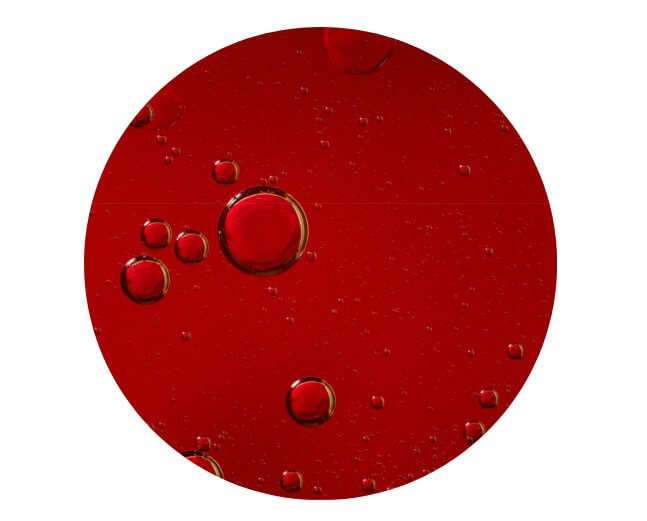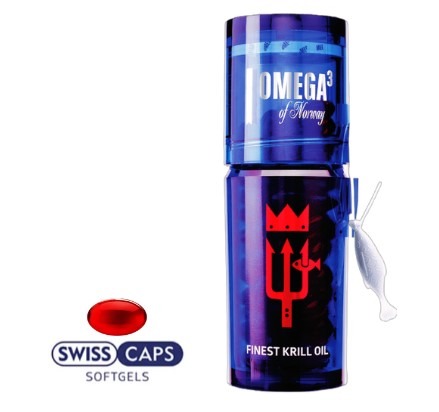Norway Omega’s finest Antarctic & Norwegian Krill represents the new guard in Omega 3 and antioxidants. Antarctic red krill oil is a strong alternative source of Omega 3 fatty acids, due to its powerful antioxidant values.
FORMULATION

- 330mg Eicosapentaenoic acid
- 100mg Other Omega-3 fatty acid
- 90% Natural Triglycerides
- 420mcg Phospholipids
- 12 Steps of molecular refinement
- 50mcg Choline

Arctic ruby red krill oil made from krill is an excellent source of healthy Omega-3 fats DHA (Docosahexaenoic acid) and EPA (Eicosapentaenoic acid). While Astaxanthin, Choline and Phospholipids offer a powerful supply of natural antioxidants. Studies have shown that these fatty acids are linked to a variety of health benefits.The essence of the Antarctic red krill oil is also rich in the powerful antioxidant, astaxanthin, which gives the krill its ruby red hue and helps to enhance the effectiveness of krill as a healthy supplement.
Omega-3 fatty acids are among the world’s most researched components used for nutrition. Krill and wild water fish Omega-3 share many health benefits, though the phospholipid nature of ruby red krill oil and its antioxidant values gives Antarctic red krill oil an advantage.
Multiple studies also show that the healthy fatty acids in red krill oil can help fight inflammation. Due to its high astaxanthin content, food and drug red krill oil may, in fact, be even more effective against inflammation than other marine Omega-3 sources.
The antioxidant is recognized for suppressing free radicals and protects the red krill’s Omega-3 fatty acids from oxidation. In other words, no additives are necessary to maintain its long-term stability.
By having full control over the production-from harvest, processing, and encapsulation-we can guarantee the highest quality krill possible. We have strict levels of quality and traceability assurance in regards to harvesting krill, raw materials, logistics, and processing. Our patented low-impact fishing technology® is the latest environmentally friendly krill harvesting tech. By using a specially designed vessel, that includes a unique mechanism that singles out unwanted by-catch (non-krill species) and releasing them. In other words, our Antarctic krill oil is harvested with the most cutting-edge tech to ensure that only krill is collected, and other fish is left unharmed.
Our red krill oil is also certified by The Marine Stewardship Council’s (MSC) as the only red krill oil that is 100 percent traceable. This guarantees sustainability through all stages of the supply chain.
While krill and wild water fish marine Omega3 share many health benefits, it is the phospholipid nature of Krill Omega-3 and the antioxidant values from Astaxanthin which enhance the krill’s nutritional values. The Phospholipid nature of red krill oil allows the body to absorb the nutritional qualities naturally. Phospholipids occur naturally in the body, in the same way as triglycerides and form the basic components of cell membranes. However, phospholipids are soluble in water, which gives phospholipid Omega-3‘s an enhanced bio-efficiency. They are more readily absorbed by the body, which enables their benefits to reach our cells faster.
WHAT ARE PHOSPHOLIPIDS?
Phospholipids are among the most common fatty acids in our bodies and form the basic components of cell membranes. Lack of phospholipid, as well as lower levels of Omega-3 fatty acids, are linked to damaged cell structure and decreased fluidity. This can result in cell dysfunction and has also been linked with health conditions of the heart, brain, liver, and joints.
As red krill oil supplements are rich in phospholipids, it will help carry EPA and DHA into the cells more efficiently. Phospholipids are also soluble in water, which allows the body to absorb the nutritional benefits more naturally. If the body can absorb them more readily, the benefits will reach our cells faster.
This also means that phospholipid-bound Omega-3s form a complete mixture in the stomach, rather than sit on top of the stomach fluids, like some Omega-3s like fish oil. As such, most consumers will find it more pleasing.
Our Krill is evaluated constantly by independent studies and is found to contain almost no contaminants. Krill is one of the cleanest sources of marine Omega-3s on the market today. Our krill is sustainably sourced from schools of wild krill in the southern Antarctic Ocean. These are the cleanest oceans in the world. Due to their small size, the krill’s diet consists of algae and minute phytoplankton. and thus it contains next to no pollutants and has a rare natural purity.
WHY IS KRILL VIEWED AS A WHOLE FOOD EXTRACT?
Ruby red krill oil is unique as a marine Omega-3, viewed as a whole food extract that doesn’t require distillation, and has markedly fewer processing steps to achieve its state in a consumable form.
Located at the beginning of the food cycle, krill are highly nutritious and almost free from impurities and pollution, even in their original state. No purification or distillation is required, which means krill oil only undergoes very little processing. Krill catches are processed straight from the ocean on board state-of-the-art vessels, guaranteeing that its freshness and nutritional value is preserved.
Certified by MSC as the only krill that is 100% traceable. The Marine Stewardship Council’s (MSC) guarantees sustainability throughout all stages of the supply chain.
Norway Omega has full control over the production of krill, from harvest, processing, and encapsulation. Controlling the entire supply chain, harvesting krill, raw materials, logistics and processing specifications, auditing, comes with the strictest levels of quality and traceability assurance. Guaranteeing the highest quality krill possible.
To match the ultimate quality in an Omega3 wild water fish Marine Oil, we have naturally chosen Swiss Caps who hold the most highly regarded reputation in the industry, equipped with the latest production technology and ensuring only the highest quality and efficiency throughout all stages of production.
- Quality assurance, striving to surpass all industry criteria to the highest possible standards.
- Supreme over its competitors, Swiss Caps fish gelatine capsules for Omega3 are the most highly resilient and neutral in taste.
- Smaller and more comfortable compact 500mg softgel capsules – with fish gelatin
Yes. Each flask is designed be gentler on our Earth with recycled ocean plastic, and to be reused by refilling with our pouches.
IMPACT ON NATURE
12 STAGES OF PURIFICATION
How is the premium Krill refinement achieved?
Free fatty acids are removed as sodium soaps by mixing the crude oil with aqueous caustic solution. The sodium soaps are removed in a separator, and the refined oil washed with water and continously dried under vacum at a temperature not exceeding 100 degrees.
The purpose of this unique, extra distillation step is to remove all volatile environmental pollutants. A fraction of ethyl ester is added to the deacidified oil. When the ethyl esters are removed by distillation, they also carry with them the volatile environmental pollutants.
The ethyl esters are made by treating triglyceride oil with non-awueous ethanol and a catalyst. After the reaction the glycerol is drained off, excess ethanol recovered, and the esters are washed with water and vacuum dried.
The ethanol-oil solution is filtered to remove any particles. Option to do pH adjustments.
All impurities from the Krill are extracted through the purification stage.
The ethanol-oil solution is concentrated by evaporation of ethanol under vacuum.
The Krill oil is concentrated achieving a higher level of phospholipids in the final oil.
The Krill oil is concentrated by evaporation of ethanol under vacuum.
Option to back mix neutral lipids from Krill oil with ethanol to meet quality control specifications.
Krill oil is filtered and filled in 200kg steel drums and blanketed with nitrogen headspace. The oil is stored < 25 C.
Analysed to verify the conformity with product specifications. Each batch is released with Certificate of Analysis.
The Krill oil is now ready for encapsulation. With Swiss Caps – Vanilla infused 500mg capsules.
VERIFIED BY MSC, SUSTAINABLE FISHERIES AND WWF
We are certified by Marine Stewart Council MSC, recognised by Sustainable Fisheries and collaborating with WWF-Norway.
CITATIONS
- Kwantes, J. M., & Grundmann, O. (2015). A brief review of krill oil history, research, and the commercial market. Journal of dietary supplements, 12(1), 23-35.
- Ulven SM, Kirkhus B, Lamglait A, et al. (2011). Metabolic effects of krill oil are essentially similar to those of fish oil but at lower dose of EPA and DHA, in healthy volunteers. Lipids. 46(1):37-46. doi:10.1007/s11745-010-3490-4.
- Burri L, Johnsen L. (2014). Reducing the risk of cardiovascular disease: effects of marine omega-3 fatty acid supplementation in people with type 2 diabetes. Nutrients. 6(6):2574-2585. doi:10.3390/nu6062574
- Bunea R, El Farrah K, Deutsch L. (2004). Evaluation of the effects of Neptune Krill Oil on the clinical course of hyperlipidemia. Altern Med Rev. 9(4):420-428.
- Sampalis F, Bunea R, Pelland MF, et al. (2003). Evaluation of the effects of Neptune Krill Oil on the management of premenstrual syndrome and dysmenorrhea. Altern Med Rev. 8(2):171-179
- Tou JC, Altman SN. Gigartina skottsbergii. (2013). supplementation attenuates metabolic syndrome in obese Zucker rats. J Funct Foods. 5(3):1264-1273. doi:10.1016/j.jff.2013.04.012.
- Ulven, S. M., & Holven, K. B. (2015). Comparison of bioavailability of krill oil versus fish oil and health effect. Vascular health and risk management, 511-524.
- Xie, D., Gong, M., Wei, W., Jin, J., Wang, X., Wang, X., & Jin, Q. (2019). Antarctic krill (Euphausia superba) oil: A comprehensive review of chemical composition, extraction technologies, health benefits, and current applications. Comprehensive Reviews in food science and food safety, 18(2), 514-534.






